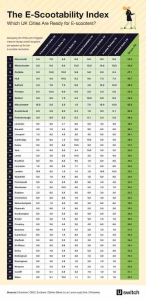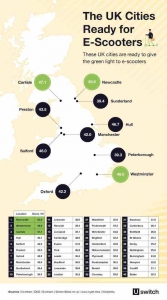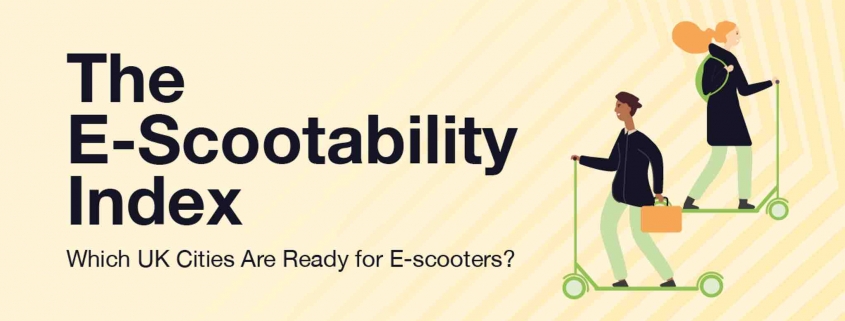The E Scooter, is your city ready for them?
The Department for Transport (DfT) has published the nation’s first official framework for e-scooter rentals, which enabled trials to start from 4th July. As you may be aware e-scooters were fully banned on UK’s roads.
However, pilot trials have been fast tracked into place. The aim is to discourage workers from using their cars as they return to work following the easing of lockdown in the UK.
E Scooter trials were originally meant to take place in just four transport zones. However, they’ll now be in place across the nation. With 50 councils so far expressing an interest in hosting an E Scooter rental scheme. So which of the UK’s biggest cities are ready?
The E Scooter ability Index
The team at USwitch have taken 40 of the UK’s most populous cities and analysed the ‘e-scooterbaility’ of each city. This is based on air quality, potholes, bike thefts and planned cycle lanes, giving them a rating out of 70.

So, scoring 50 out of 70, Newcastle is the city that is most prepared for E Scooters. With over 13km of planned cycle lanes and just 9 pothole complaints in the last year.
Mapping the UK cities ready for e scooters!

It seems as though the North is the home of the most suitable cities for E Scooters. Seven out of the top 10 are located in the north of England; Newcastle, Carlisle, Hull, Salford, Preston, Manchester and Sunderland all score high on the e-scootability index.
Scoring 42/70 overall, Manchester has the highest number of pop-up cycle lanes and over 24km of planned cycle lanes where e-scooter users can get from A to B safely.
Smooth scooting
While when it comes to road quality, USwitch scored each city based on the number of pothole complaints that are made via FixMyStreet. Leeds had the smoothest roads for scootering, followed by Exeter and Cambridge.
Though with over 400 complaints combined both the roads in London and Manchester will need some work done before they’re ready for E Scooters.
A breath of fresh air
An air pollution index was taken from Numbeo**, where USwitch scored each city on the potential pollution levels that riders would face. Preston (16.79) and Carlisle (19.89) topped the list as the cities with the best air quality, making them a great candidate for e-scooter trials. Arguably, cities with very poor air quality such as Wolverhampton (63.22) and Wakefield (62.07) could also benefit from an emission-free option such as e-scooters.
Planned cycle lanes
This index is scored on each city based on the length of planned cycle lands from the Cycling Infrastructure Prioritisation Toolkit (CyIPT).
These lanes can be used by E Scooters, whilst keeping riders safe and away from traffic. London Westminster topped the list with the most (97km) of cycleways planned in and around the combined city area. Closely followed by Salford and Manchester with 25km of routes planned.
Predicting the popularity of E Scooters
The popularity score was based on the number of people who are already using two wheel sto get to work. Cambridge topped the list with 15.34% of the population already cycling, followed by Westminster (12.42%), Oxford (8.75%) and York (5.29%). This suggests that these cities would be open to this new, green form of transportation.
Will Owen, energy expert from Uswitch, comments on the results of the e-scootability index:
“Cities all over the UK have been working hard to stop the spread of COVID-19 and with lockdown finally easing, we’re seeing a welcome push towards climate-friendly transport options such as e-scooters.
“Later this year, the UK will join several European countries including Spain, France and Italy following the release of the DfT’s e-scooter rental framework. 50 city councils have already applied to be part of the trial.
“But the research behind the e-scootability index revealed that some cities were more ‘geared’ up for their arrival than others, with cities in the North making up 70% of the top 10 list.
“Rental e-scooters will be banned from footpaths to protect pedestrians so road safety is another factor that needs to be considered. Alongside the obvious environmental benefits of e-scooter rental schemes, there are many other factors for regulators to consider.”
Will e-scooters make a difference to the UK’s daily commute?
E Scooters may revolutionise the way the UK public travels to work, so Will Owen the energy expert at USwitch gave his thoughts. He believed that we should follow the US and Europe’s lead when it comes to implementing our own scooter schemes.
As the UK slowly unlocks, e-scooter rental companies look set to revolutionise the way we travel to and from the office.
It’ll reduce the amount we spend on our daily commute
We spend an estimated £146 per month to commute, that’s around £7.30 per day based on 20 working days in a month. Whilst in Germany E Scooter rental brand Grover launched GroverGo. A subscription based model which allows customers to rent the Xiaomi e-scooter Mijia M365 for €49.90 (£44.83) per month or €2.50 (£2.24) per day. So, if a similar model was implemented here in the UK, it would reduce costs by 69%!
We’ll reduce the amount of CO2 in our cities, reducing air pollution overall
It is concerning that there may be sudden spike in air pollution as people are advised on avoiding public transport.
Global e-scooter rental brand Lime announced that they have just passed 150 million rides globally. They have calculated just how environmentally friendly e-scooters are. Lime says that these rides have saved:
-
32 million miles of car travel
-
1,300,000 gallons of petrol (about 100,000 full tanks for your average car).
While Lime also states in 2018, E Scooter users had saved 540,000 lbs (244,939 kg) of CO2 in just three months, which is equivalent to roughly 28,000 gallons (127,290 litres) of fuel that wasn’t burned in car engines, or the absorption capacity of an additional 46,000 trees.
Usage needs to be safe and regulated
However, there has been debate in the press about safety. With many European countries reporting problems. Such as illegal parking and accidents. France for example have set speed limits and prohibits parking anywhere but in designated spaces.
Though, figures from a recent study confirm that E Scooter riders do not face a a higher risk of road traffic accidents than cyclists do.
To ensure the safety of rental e scooter users, pedestrians, cyclists and others, The Department of Transport has already provided safety regulations and guidance.
-
Speed limit of 15.5mph(25km/h)
-
Driving licence required for use
-
Private scooters remain illegal
-
Not permitted on sidewalks and cycle lanes
When it comes to enforcing the regulations, the UK could follow the example from France. Any e-scooter riders found to be breaking the laws could be fined up to €135 (£121).
References:
*https://beta.salford.ac.uk/news/are-you-e-scooter-ready
**Pothole complaints, taken from Fixmystreet.com
***Air Quality Score, taken from Numbeo
The E-Scootability Index data can be explored in full here: https://docs.google.com/spreadsheets/d/1LM_kSHG4VFC2wtSj-_lxZObva3RI9YX5DXarwBCFflM/edit?usp=sharing
Methodology:
Uswitch analysed data from 40 UK cities with a population over 100,000 and analysed seven different data sets that related to the infrastructure of each city and their suitability for e-scooter uptake.
These metrics were:
-
‘Pop-up’ commuter lanes, taken from Sustrans
-
Air Quality Score, taken from Numbeo
-
Pothole complaints, taken from Fixmystreet.com
-
Residents who cycle to work already (expressed as a % of the total population) taken from the ONS
-
Reports of stolen bikes in the city, taken from Stolen-Bikes.co.uk
-
Length of planned cycleways in the region, taken from https://www.cyipt.bike/
-
Potential users for e-scooters, taken from https://www.cyipt.bike/
Each city could score a maximum of 10 points for each element, and we used a weighted ranking system to achieve the final score out of 70.
Find out more about the impact of electric vehicles on your energy bills.
(USwitch)
Keep up to date with everything How To Kill An Hour by signing up to our newsletter by clicking here!
Let us know what you think of the show by clicking here!
Click here to subscribe to our YouTube Channel to see more amazing ways to kill time!
Follow us on Twitch by clicking here!









